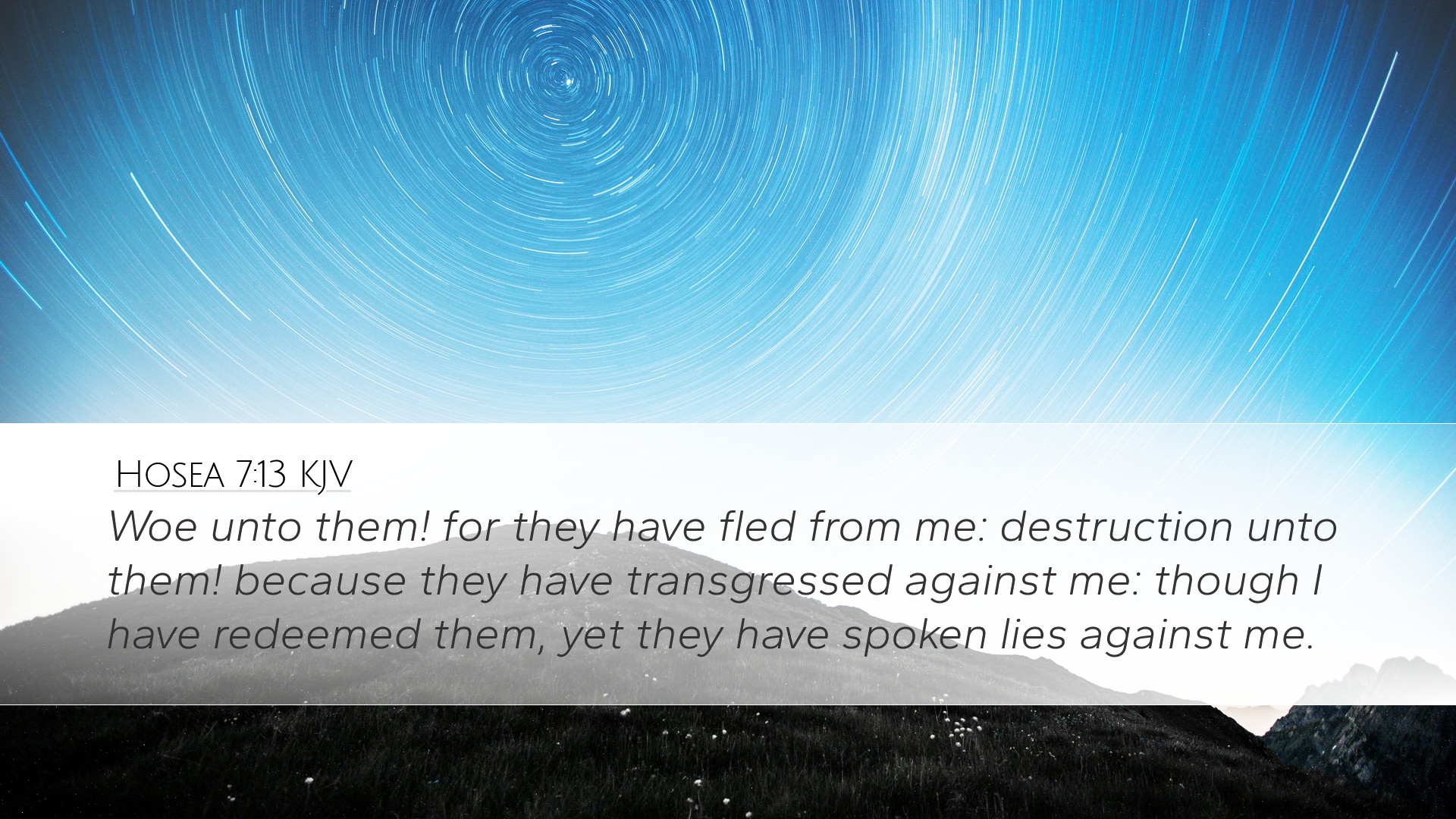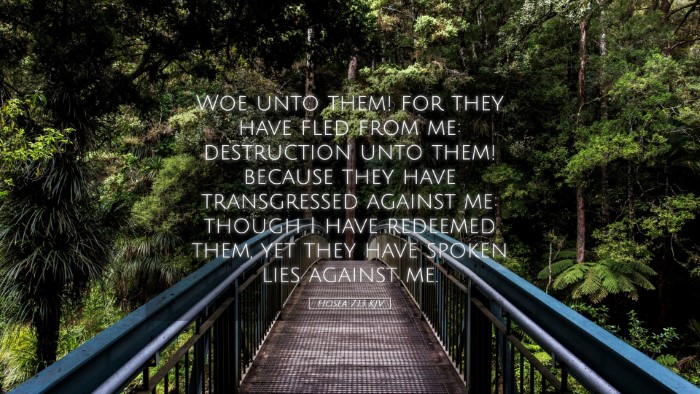Old Testament
Genesis Exodus Leviticus Numbers Deuteronomy Joshua Judges Ruth 1 Samuel 2 Samuel 1 Kings 2 Kings 1 Chronicles 2 Chronicles Ezra Nehemiah Esther Job Psalms Proverbs Ecclesiastes Song of Solomon Isaiah Jeremiah Lamentations Ezekiel Daniel Hosea Joel Amos Obadiah Jonah Micah Nahum Habakkuk Zephaniah Haggai Zechariah MalachiHosea 7:13
Hosea 7:13 KJV
Woe unto them! for they have fled from me: destruction unto them! because they have transgressed against me: though I have redeemed them, yet they have spoken lies against me.
Hosea 7:13 Bible Commentary
Commentary on Hosea 7:13
Verse Reference: Hosea 7:13 - "Woe to them! For they have fled from me; destruction to them! For they have rebelled against me; I would redeem them, but they speak lies against me."
Introduction
The Book of Hosea is a poignant reflection on God's enduring love for His people despite their persistent rebellion and unfaithfulness. Chapter 7 presents a deep examination of Israel's spiritual condition, and verse 13 encapsulates the tragic consequences of their sinfulness. This commentary draws insights from various public domain commentaries to elucidate the themes present in this verse.
Exegesis of Hosea 7:13
This verse consists of two significant proclamations that reveal the gravity of Israel's sin and God's merciful intention toward them.
- "Woe to them!" - This significant pronouncement of woe indicates impending judgment and sorrow due to the people's blatant rejection of God.
- "For they have fled from me;" - This phrase emphasizes the voluntary nature of Israel's rebellion. They have chosen to turn away from the source of life and protection.
- "destruction to them!" - The inevitability of destruction serves as a warning and highlights the consequences of forsaking God's commandments.
- "For they have rebelled against me;" - Their rebellion signifies a deliberate act of defiance, rejecting God's authority and covenant relationship.
- "I would redeem them, but they speak lies against me." - Here, God's desire for redemption contrasts sharply with Israel's situation, emphasizing their untruthfulness and misleading representations of Him.
Theological Implications
The themes presented in this verse resonate profoundly within theological discussions, particularly concerning God’s justice and mercy.
- Divine Judgment: Matthew Henry observes that God's declaration of "woe" serves as a reminder of the dire consequences of forsaking divine commandments. Such a warning serves to elicit repentance among the faithful.
- Grace in Rebellion: Albert Barnes emphasizes that while Israel has rebelled, God's intent remains to redeem. This highlights the paradox of grace where the offer of redemption is extended even amidst rebellion.
- The Nature of Sin: Adam Clarke notes the seriousness of idolatry and false worship represented in Israel's actions. Their lies not only distort their relationship with God but also lead them farther into spiritual decay.
Pastoral Applications
This verse is rich with applications for modern pastoral ministry, offering profound insights for personal and congregational reflection.
- Call to Repentance: Pastors can use this passage to urge their congregations toward self-examination and a return to God. The message of "woe" serves as a critical reminder of the dangers associated with drifting away from divine truths.
- Highlighting God’s Faithfulness: In teaching, leaders can underscore that despite human sinfulness, God's redemptive purpose remains unchanged. Much like Israel, today’s believers are called to recognize their need for God's grace.
- Understanding Spiritual Lies: The commentary suggests examining what "lies" may be perpetuated within Christian communities, encouraging believers to seek authenticity in their relationship with God.
Conclusion
Hosea 7:13 serves as a somber reminder of the consequences of a life removed from God, while simultaneously showcasing His unyielding desire to redeem His people. As students of Scripture, theologians, and pastors reflect on this passage, it becomes clear that the invitation to return to a faithful relationship with God remains open, no matter how far one may have strayed.


